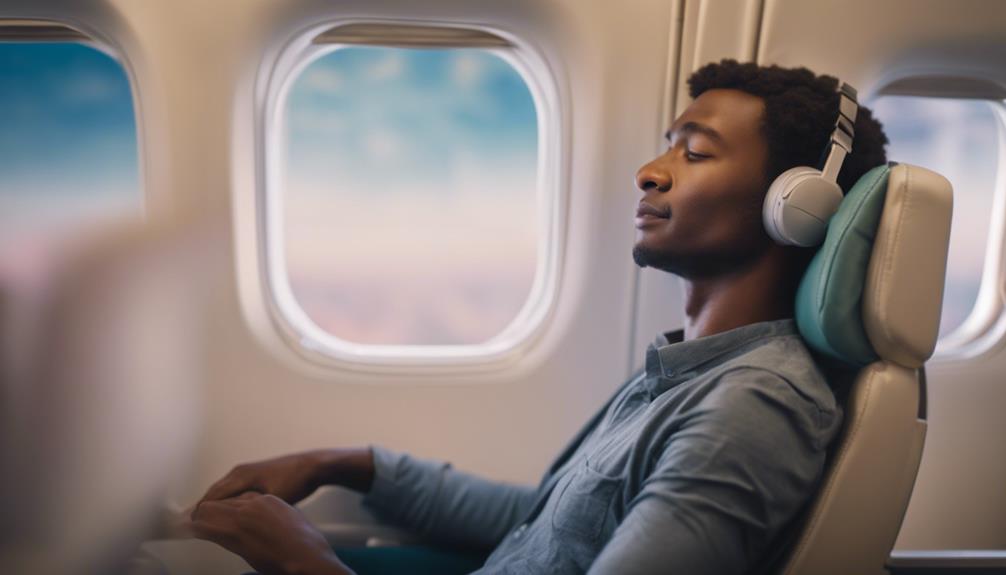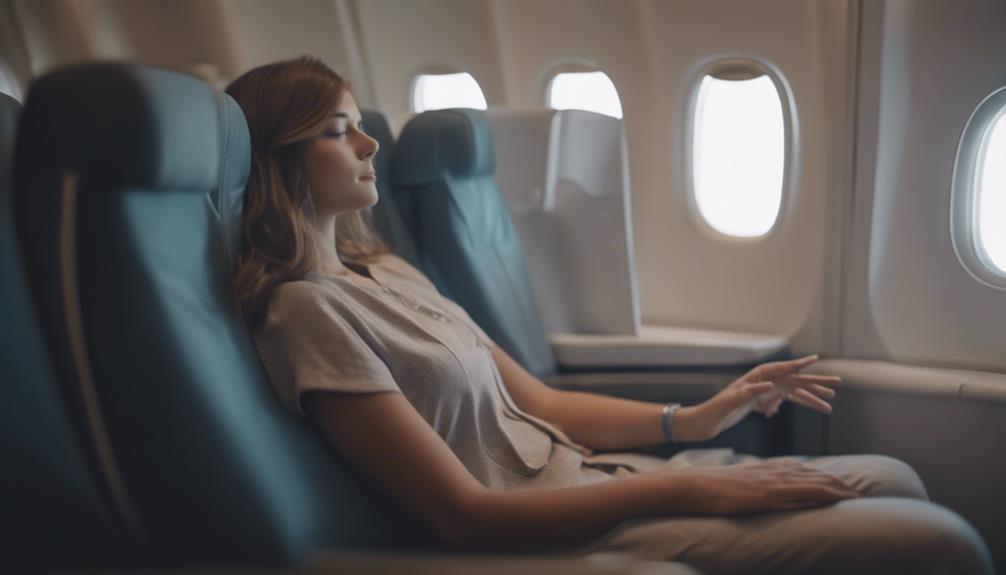
Hypnosis, EFT, and NLP are effective tools for overcoming passenger travel fear. Hypnosis explores subconscious root causes, reshaping negative patterns. EFT tapping balances energy, releasing emotional blocks. NLP strategies aid in reframing thoughts for anxiety reduction. Sessions help confront fears safely, instilling control and relaxation. These techniques equip individuals to navigate travel stressors calmly, enhancing overall well-being. Consider exploring how these modalities can empower you to conquer travel-related fears and anxieties.
Understanding Passenger Travel Fear
When it comes to understanding passenger travel fear, it is essential to explore the underlying triggers and psychological mechanisms that contribute to this common phobia. Fear triggers associated with travel anxiety can stem from various sources such as fear of flying, fear of enclosed spaces, fear of the unknown, or past negative experiences during travel. These triggers can manifest as physical symptoms like sweating, increased heart rate, or even panic attacks.
The impact of travel anxiety can be significant, leading individuals to avoid traveling altogether or endure extreme distress during travel, affecting their quality of life. Coping mechanisms such as deep breathing exercises, visualization techniques, and cognitive-behavioral strategies can help individuals manage their fears and anxieties related to passenger travel. However, for some individuals, these coping mechanisms may not provide sufficient relief.
Recognizing the complex nature of passenger travel fear and its effects on individuals is vital in developing effective interventions to address this phobia and improve the travel experience for those who struggle with it.
Introduction to Hypnosis for Fear

Exploring the potential of hypnosis as a therapeutic approach for addressing fear and anxiety can offer individuals a unique and holistic perspective on managing their emotional challenges. When it comes to fears and phobias, hypnosis presents itself as a powerful tool that can help individuals navigate through their subconscious mind to uncover and address the root causes of their fears.
One of the primary benefits of hypnosis in tackling fear is its ability to access the subconscious mind, where deep-seated beliefs and emotions reside. Through techniques such as guided imagery, relaxation, and suggestion, hypnosis can assist individuals in reprogramming negative thought patterns and responses related to fear. By introducing calming and empowering suggestions during a hypnotic state, individuals can cultivate a sense of control and confidence in dealing with their fears.
Exploring EFT Techniques

Utilizing EFT techniques can provide individuals with a complete and effective approach to addressing fears and anxieties in a holistic manner. EFT tapping, a pivotal component of Emotional Freedom Techniques, involves gently tapping on specific meridian points on the body while focusing on the fear or anxiety experienced. This process aims to rebalance the body's energy and address the emotional distress associated with the phobia of passenger travel.
Through EFT tapping, individuals can release emotional blockages and reframe negative thought patterns related to travel fears. This technique allows for the acknowledgment and acceptance of these emotions while actively working towards resolving them. By tapping into the body's energy system, EFT facilitates an emotional release, enabling individuals to let go of deep-seated fears and anxieties that may be holding them back from enjoying travel experiences.
Incorporating EFT techniques into a thorough approach that combines hypnosis, EFT, and NLP strategies can provide a powerful toolkit for overcoming the fear of passenger travel. By addressing the emotional component through EFT tapping, individuals can work towards a more positive and confident mindset when it comes to traveling.
NLP Strategies for Anxiety

Applying Neuro-Linguistic Programming (NLP) strategies offers individuals practical tools to effectively manage and alleviate anxiety related to passenger travel. NLP techniques can be powerful resources in helping individuals reframe their thoughts, emotions, and behaviors in a way that reduces anxiety and promotes a sense of calmness. Here are three key NLP strategies for anxiety management and stress relief:
- Anchoring Techniques: Utilizing anchors, such as associating a specific touch or phrase with a calming state, can help individuals quickly access a relaxed state during stressful moments of travel.
- Visualisation: Guided visualization exercises can assist individuals in mentally rehearsing successful and calm travel experiences, reducing anticipatory anxiety.
- Language Patterns: By becoming aware of and reshaping self-talk and internal dialogue, individuals can shift from negative thought patterns to more empowering and positive beliefs, fostering a sense of control and confidence.
Overcoming Fear With Hypnosis

In addressing the fear of passenger travel, hypnosis emerges as a powerful tool for overcoming anxiety and fostering a sense of calmness and control. Fear management is a complex process, and hypnosis offers a unique approach to tackling deep-rooted fears. Hypnosis benefits individuals by tapping into their subconscious mind, where fears often originate, allowing for targeted interventions to reframe negative thought patterns. Through guided hypnosis sessions, individuals can confront their fears in a safe environment, gradually desensitizing themselves to triggers associated with travel anxiety.
Hypnosis is effective in helping individuals regain a sense of control over their emotions and responses, empowering them to manage their fear of passenger travel more effectively. By addressing underlying anxieties and instilling relaxation techniques, hypnosis equips individuals with the tools to navigate travel-related stressors with greater ease. The benefits of hypnosis extend beyond just managing fear; it can also enhance overall well-being and resilience in the face of challenging situations.
EFT for Travel Phobia

Addressing travel phobia can be effectively supported through the practice of Emotional Freedom Techniques (EFT). EFT is a powerful tool that combines acupressure and modern psychology to help individuals release negative emotions and overcome fears. When it comes to travel phobia, EFT can provide a holistic approach to help individuals achieve emotional freedom and relaxation during their journeys.
Using EFT for travel phobia involves:
- Tapping on Acupuncture Points: By tapping on specific acupuncture points on the body while focusing on the fear of travel, individuals can help release the emotional intensity associated with their phobia.
- Positive Affirmations: Incorporating positive affirmations during the EFT practice can help rewire the brain and replace negative beliefs with empowering thoughts related to travel relaxation.
- Visualization Techniques: Utilizing visualization techniques while tapping can enhance the effectiveness of EFT, helping individuals create a sense of calmness and security when thinking about traveling.
Through the practice of EFT, individuals can work towards achieving emotional freedom and overcoming their fear of passenger travel.
NLP Visualization Techniques

Utilizing NLP visualization techniques can be a powerful way to overcome fear of passenger travel.
By incorporating positive anchoring techniques and future pacing exercises, individuals can reframe their mindset and build confidence in their ability to travel comfortably.
These techniques offer a practical and insightful approach to shifting one's perception and creating a sense of ease and assurance during travel.
Positive Anchoring Techniques
By employing positive anchoring techniques, individuals can harness the power of NLP visualization methods to cultivate a sense of calm and confidence during passenger travel. Anchoring benefits include creating positive associations and emotional states linked to specific triggers, enhancing one's ability to manage anxiety and fear effectively.
Techniques such as visualizing a serene place or recalling a past successful travel experience can help anchor feelings of relaxation and security. Positive reinforcement through affirmations and mental imagery can strengthen these anchors, providing a reliable source of comfort when faced with travel-related stressors.
Future Pacing Exercise
To further enhance the positive associations and emotional states linked to passenger travel, individuals can engage in Future Pacing Exercises utilizing NLP visualization techniques. Future pacing exercises involve mentally rehearsing a future situation, in this case, a comfortable and relaxed experience during passenger travel.
Through consistent visualization practice, individuals can create a sense of familiarity and ease with the process of traveling as a passenger. By vividly imagining themselves feeling calm, confident, and at ease while traveling, they can effectively reprogram their subconscious mind to associate positive emotions with this experience.
This technique can help individuals overcome their fear or phobia of passenger travel by building new neural pathways that support feelings of comfort and relaxation in such situations.
Hypnosis and Confidence Building

Building confidence through hypnosis is a potent tool that can greatly boost self-assurance levels and enhance self-belief.
By tapping into the subconscious mind, hypnosis can help individuals overcome limiting beliefs and instill a deep sense of confidence.
Through targeted hypnotherapy sessions, individuals can cultivate a strong foundation of self-assuredness to navigate challenges with resilience and poise.
Boosting Self-Assurance Levels
Enhancing self-assurance through hypnosis and confidence-building techniques can empower individuals to overcome their fears and step into a mindset of strength and resilience. Building confidence and boosting self-esteem are key components in addressing travel phobias.
Here are three practical ways to boost self-assurance levels:
- Positive Affirmations: Implementing daily affirmations can rewire negative thought patterns and instill a sense of self-belief.
- Visualization Techniques: Guided visualizations can help individuals imagine themselves confidently moving through travel situations, reinforcing a positive self-image.
- Progressive Exposure: Gradually exposing oneself to travel-related triggers in a controlled environment can build confidence and reduce anxiety levels over time.
Enhancing Self-Belief Through Hypnosis
Through the application of hypnosis techniques, individuals can effectively nurture a deep sense of self-belief that serves as a powerful foundation for overcoming travel phobias and embracing newfound confidence.
Hypnosis can enhance focus by helping individuals redirect their thoughts and emotions towards positive outcomes, enabling them to visualize successful travel experiences and confront their fears with a sense of calm and control.
Additionally, hypnosis aids in building resilience by instilling a belief in one's ability to cope with challenging situations, thereby reducing anxiety and increasing self-assurance during travel.
EFT Tapping for Calmness

To cultivate a sense of calmness using EFT tapping, individuals can gently tap on specific acupressure points on their body while focusing on acknowledging and releasing any feelings of anxiety or stress. EFT tapping works by stimulating the body's energy meridians to promote a relaxation response.
Here are three key acupressure points to focus on during EFT tapping for calmness:
- Karate Chop Point: Located on the outer edge of the hand, this point is often used to begin an EFT tapping sequence.
- Top of the Head: Tapping on the crown of the head can help release tension and promote a sense of peace and tranquility.
- Inner Wrist: By tapping on the inside of the wrist, near the base of the palm, individuals can help alleviate feelings of anxiety and promote a state of calm.
NLP Anchoring for Relaxation

Having established techniques for cultivating calmness through EFT tapping, another effective method for promoting relaxation is NLP anchoring. This technique involves creating powerful associations with states of tranquility and ease. NLP anchoring works by linking a specific trigger, such as a touch or a word, to a desired emotional state, like relaxation. When the anchor is applied, it can instantly evoke feelings of peace and tranquility, helping individuals to manage stress and anxiety effectively.
In addition to NLP anchoring, other relaxation techniques like mindfulness meditation and progressive relaxation can complement each other in promoting a sense of calm. Mindfulness meditation encourages individuals to focus on the present moment, acknowledging thoughts and feelings without judgment, which can help reduce stress and promote relaxation. On the other hand, progressive relaxation involves systematically tensing and relaxing different muscle groups in the body, promoting physical and mental relaxation.
Frequently Asked Questions
Can Hypnosis, Eft, and NLP Be Effective in Treating Other Types of Phobias or Fears Besides Passenger Travel?
Anxiety management and phobia treatment extend beyond passenger travel fears. Hypnosis, EFT, and NLP offer effective techniques for addressing various phobias and fears. By understanding the root causes and employing tailored strategies, individuals can overcome these challenges successfully.
Are There Any Potential Side Effects or Risks Associated With Using Hypnosis, Eft, or NLP for Overcoming Fear of Passenger Travel?
When pondering the safety concerns of utilizing alternative therapies for overcoming fears, addressing potential risks becomes crucial. Evaluating the long-term effectiveness and contemplating a combination therapy approach can enhance the overall outcome for individuals seeking relief.
How Long Does It Typically Take to See Results When Using Hypnosis, Eft, or NLP for Treating Fear of Passenger Travel?
Results from treatment for fear of passenger travel vary based on individual factors. Typically, success rates can be seen within a few sessions to a few weeks. Patient testimonials often highlight the importance of therapist qualifications in achieving long-lasting positive outcomes.
Can These Techniques Be Used in Combination With Traditional Therapy or Medication for Passenger Travel Fear?
Alternative therapies such as hypnosis, EFT, and NLP can be effectively integrated with traditional therapy or medication to address passenger travel fear. Integrative approaches offer a holistic strategy to manage and overcome phobias, enhancing overall treatment outcomes.
Are There Any Specific Qualifications or Certifications That a Practitioner Should Have in Order to Effectively Use Hypnosis, Eft, or NLP for Treating Fear of Passenger Travel?
When evaluating practitioners for addressing passenger travel fear, it is crucial to prioritize certification requirements and practitioner qualifications. Ensuring expertise and specialization in treating phobias of different types can greatly improve the treatment effectiveness and offer targeted support to individuals seeking help.
Conclusion
To sum up, by employing hypnosis, EFT, and NLP techniques, individuals can overcome their fear of passenger travel and experience a sense of calmness and relaxation.
As the saying goes, 'Facing your fears is the only way to conquer them.'
These tools offer practical and insightful ways to address anxiety and build confidence, ultimately allowing individuals to enjoy their travel experiences without fear holding them back.
Take the Next Step
Do not be afraid to reach out to me, Mark E Wilkins, to assist you in any issues you might have. Most Hypnotherapy sessions last 2 hours and EFT Sessions are usually handled with one session. Life Coaching is 45 minute session, once a week. Self-Hypnosis is taught in one session, and lasts a lifetime.
To make an appointment, first listen to the Pre-talk and fill out he Complementary Healthcare Provider Disclosure. The use the Contact Form to request an appointment with the Bohol Hypnosis Expert.
Self-help downloads are available. The self-hypnosis program to teach you how to self-hypnotize is here.





